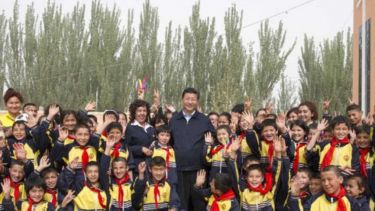The “Xinjiang Papers”: How Xi Jinping commands policy in the People’s Republic of China
This report shows how “the Xinjiang papers” reveal the centralised decision-making processes behind mass mobilisation, mass detention, and dispersal of Uyghur and other Turkic-speaking Muslim communities in the Xinjiang Uyghur Autonomous Region (XUAR).

Dr David Tobin, Lecturer in East Asian Studies has published his report on The “Xinjiang Papers”: How Xi Jinping commands policy in the People’s Republic of China.
Under Xi Jinping’s rule of the People’s Republic of China (PRC), at least one million Turkic-speaking Muslims in the Xinjiang Uyghur Autonomous Region (XUAR) have been extralegally detained in camps, subjected to invasive surveillance, sexual violence, child-separation, and psychological trauma. Nearly 10 million Uyghurs and Kazakhs outside the camps navigate networks of checkpoints, interpersonal monitoring, hi-tech surveillance, and forced labour. This report reveals the centralised decision-making processes behind mass mobilisation, mass detention, and dispersal of Uyghur and other Turkic-speaking Muslim communities in Xinjiang.
The dangers of conducting research in this environment mean that significant policy information comes from government document leaks. The ‘Xinjiang Papers’ leak, acquired by the London-based Uyghur Tribunal, was analysed by Adrian Zenz and reviewed by David Tobin and James Millward. A public hearing discussed the content of the papers with full document transcripts available to all. Significant international media coverage followed, from the BBC, Wall Street Journal, the Guardian, and Vice, alongside op-ed essays in the Conversation and RUSI.
This report provides policymakers and researchers with deeper analysis of “the Xinjiang papers,” to explain what they reveal about the practical operation of China’s political system under Xi, and how he commands policy in Xinjiang.
The report analyses:
The thinking behind Xi’s micro-managed Xinjiang policy.
Institutional shifts towards totalitarianism to ensure policy implementation.
The arbitrary nature of mass detention and community dispersal of Uyghurs and other Turkic-speaking Muslims.
This report explains the thinking and mechanisms behind Xi Jinping’s Xinjiang policy, which targets signs of everyday Uyghur identity as security threats. It provides new evidence of centrally directed local implementation of mass detention (section 4.2) and arbitrary dispersal of Uyghur communities (4.3). The report shows how Xi is transforming the PRC’s political system towards a totalitarian model based on personalised rule, mass mobilisation and surveillance, ideological education, and transformation of thought. Xi’s micro-managed policy implementation prevents any opposition to genocidal practices, including cultural destruction (section 3: “Sinicisation” policy), arbitrary mass detention, and community dispersal. Mass human surveillance links party institutions, security services, and neighbourhoods in the “People’s war on terror” (4.1).
Xi’s focus on policing everyday thought is strictly imposed through regular party meetings and education sessions for cadres and security personnel, which outline his ideological principles and severe punishments for alternative thought or failing to implement his personal orders (section 2). The policy approach of democratic states towards the PRC under Xi Jinping requires new longer-term, strategic planning that is realistic about the PRC’s power and its domestic and international goals under Xi Jinping. Neither “openness” and “dialogue” nor straight-forward “de-coupling” address the complexity of international relations with China.
Policymakers must grapple with the reality of the PRC’s power and its totalitarian institutional structure under Xi that shapes its diplomacy and political goals.
